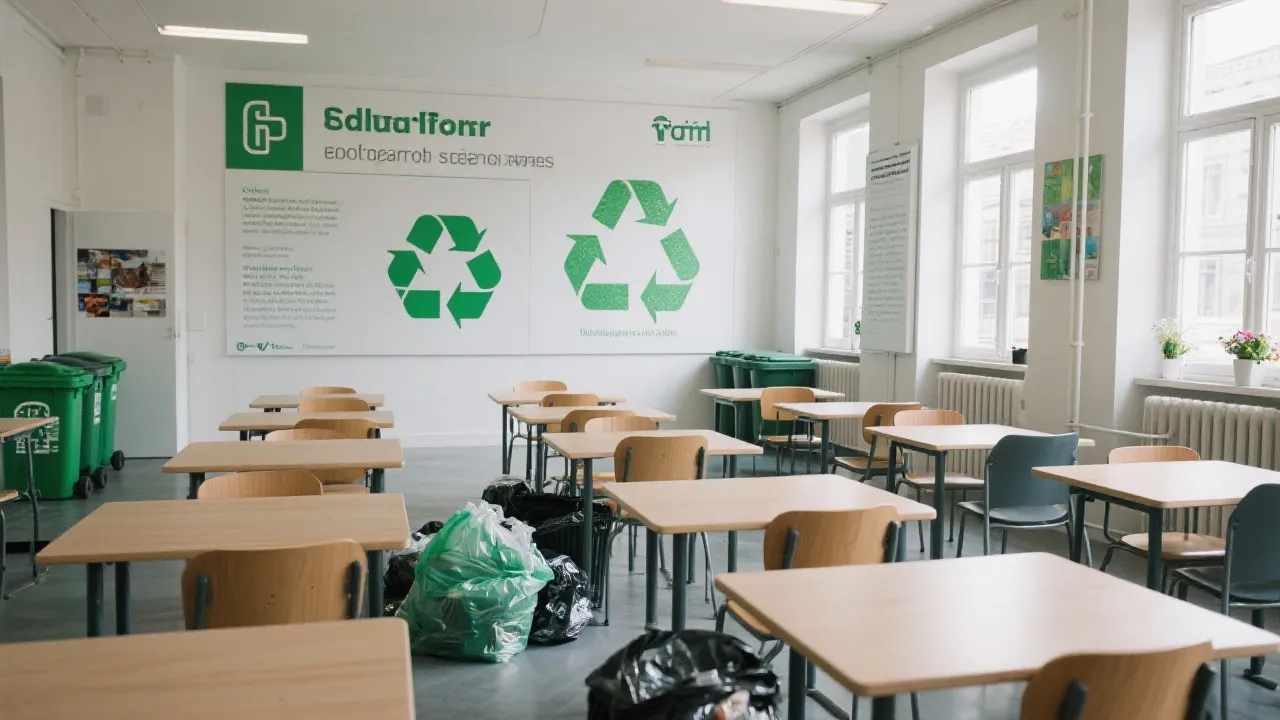Mba in Waste Management Nearby
The MBA in Waste Management offered nearby is designed for aspiring leaders in the sustainability sector. This program combines strategic business training with specialized knowledge in managing waste efficiently, catering to the increasing demand for sustainable solutions in urban areas. It prepares students to tackle global environmental challenges through innovative strategies and leadership skills.

Introduction to Waste Management MBA
In recent years, the field of waste management has gained remarkable attention, especially as cities grapple with the challenges of urbanization and environmental sustainability. The MBA in Waste Management, offered nearby, provides an advanced platform for individuals eager to make a difference in the environmental sector. This program not only equips students with business acumen but also integrates critical aspects of waste management with a focus on innovation and efficiency. Understanding waste management is essential in today’s world where the effects of climate change and increasing pollution are increasingly evident. Through this program, students are prepared to tackle these contemporary challenges using business strategies that are ethically and environmentally responsible.
The Importance of Waste Management Education
Waste management has become a cornerstone of sustainable development strategies. As cities expand, the generation of waste grows exponentially, necessitating effective management systems. An MBA specializing in this domain arms professionals with the knowledge to implement environmentally friendly practices and contribute to a greener future. Moreover, it positions them as leaders who can influence policy and advocate for sustainable urban planning. The role of waste management in creating sustainable cities cannot be overstated; it plays a critical role in improving the quality of life for residents and protecting the environment for future generations.
Furthermore, the increasing necessity for effective waste management is underlined by the rise in global consumption patterns leading to larger waste generation. These issues mandate that professionals in the field are trained to design comprehensive waste management systems that align with sustainability goals. As the challenges facing municipalities continue to evolve, the MBA in Waste Management prepares its graduates to adapt to new technologies and methodologies, develop strategic initiatives and operational frameworks, and drive innovative programs that encourage societal change.
Curriculum Overview
The curriculum of the MBA in Waste Management covers a wide range of subjects. Core business modules such as strategic management, leadership, and finance are combined with specialized courses in environmental policies, sustainable operations, and waste technology. This integration ensures that students are not only business-savvy but also adept at handling the complexities of waste-related issues critically. This multifaceted approach empowers students to draw connections between business principles and environmental practices, thus shaping them into well-rounded professionals.
In addition to core courses, students often engage in practical experiences through internships and project work. These opportunities expose them to the real-world challenges of waste management, promoting hands-on learning and fostering collaboration with industry experts. Networking with professionals and engaging in community projects also enhances their understanding and opens pathways for future employment.
| Modules | Description |
|---|---|
| Strategic Management | Focuses on crafting strategies for environmental-friendly business operations. |
| Environmental Policies | Explores frameworks and regulations governing sustainability in business practices. |
| Sustainable Operations | Analyzes efficient waste management practices for urban areas. |
| Waste Technology | Studies the technological advancements in waste processing and recycling. |
| Project Management | Covers methodologies for planning and executing waste management projects effectively. |
| Public & Private Sector Partnership | Examines collaboration between governmental entities and businesses to optimize waste management. |
| Circular Economy Principles | Introduces concepts for designing waste out of the production cycle and fostering resource recovery. |
Career Prospects
Graduates of the MBA in Waste Management possess diverse career opportunities. They can lead sustainability initiatives within corporations, work as consultants, or engage in policy-making roles. The demand for such expertise is on the rise as both public and private sectors recognize the importance of robust waste management systems for environmental conservation. Roles in this sector not only offer excitement and challenge but also access to various industries, including consulting firms, non-profit organizations, governmental agencies, and corporations that require waste management solutions.
Some specific careers that graduates might pursue include:
- Sustainability Manager: These professionals develop and oversee programs that enact sustainable practices within organizations.
- Environmental Consultant: They advise companies on how to minimize waste, comply with environmental laws, and achieve sustainability goals.
- Waste Management Coordinator: This role involves overseeing municipal waste management operations and ensuring compliance with environmental regulations.
- Policy Analyst: They research and develop policies related to waste management, sustainability, and environmental issues.
- Corporate Social Responsibility (CSR) Specialist: These specialists create plans and initiatives that promote sustainable practices and community engagement.
The evolution of technology in waste management, such as the rise of smart waste management systems, further enhances career prospects for MBA graduates. Professionals in the sector must keep pace with advancements in waste processing, recycling, and resource recovery technologies, increasing the importance of ongoing education and professional development.
Impacts of Waste Management on Society and Environment
The impacts of effective waste management extend beyond operational efficiencies—it significantly influences social equity, public health, and environmental sustainability. Good waste management practices can improve living standards, reduce health risks from poorly managed waste, and minimize environmental degradation. Understanding waste management's role within a societal context is a critical component of the MBA curriculum, as it prepares graduates to advocate for practices that benefit communities and ecosystems alike. The ramifications of landfill overflow, inadequate recycling systems, and hazardous waste disposal are far-reaching, affecting everything from local economies to global climate patterns.
Additionally, the link between waste management and resource conservation cannot be overlooked. Effective waste management contributes directly to reducing greenhouse gas emissions, promoting recycling, and encouraging the responsible use of resources. Students learn that by embracing a holistic perspective of waste—including its generation, disposal, and potential for recovery—they can become advocates for systemic changes that lead to sustainable resource management.
Technological Innovations in Waste Management
The integration of technology in waste management processes offers innovative solutions to some of the most pressing challenges in the sector. Students in the MBA in Waste Management learn about emerging technologies, such as automated waste sorting systems, mobile applications for reporting waste issues, and data analytics for optimizing waste collection routes. Understanding these technologies is critical not only for improving efficiency but also for enhancing recovery, recycling, and reuse processes.
The advent of smart bins that use sensors to monitor waste levels is transforming waste collection strategies, allowing municipalities to optimize collection routes and schedules based on real-time data. Wearable technology for waste management personnel enhances safety and monitoring activities in hazardous waste environments. Additionally, the use of Artificial Intelligence in analyzing waste production patterns helps in devising targeted waste reduction strategies.
Moreover, technology gives rise to innovative recycling methods, such as advanced pyrolysis and gasification processes, which convert waste into energy or fuel. As waste-to-energy technologies mature, they present opportunities for reducing landfill reliance while generating renewable energy. Integrating these technological insights into the MBA curriculum ensures that graduates are well-equipped to navigate and lead in a rapidly evolving landscape.
Global Perspectives and Policies in Waste Management
Understanding waste management within a global context is vital, especially as various countries adopt different policies and best practices. The MBA program includes an in-depth analysis of international waste management policies, comparing frameworks from developed and developing nations. This global perspective prepares students to implement contextually relevant waste management techniques that reflect the multifaceted nature of the field. Students explore successful case studies from around the world, such as zero-waste initiatives in countries like Sweden and Japan's advanced recycling systems, which highlight effective solutions to waste-related challenges.
Additionally, the roles of international organizations, such as the United Nations Environment Programme (UNEP) and the World Bank, in shaping waste management policies showcase the collaborative efforts necessary to address global waste issues. Graduates learn how to navigate and influence policy discussions on sustainable waste management both locally and globally. Furthermore, understanding the intricacies of policy formulation equips them to better engage with stakeholders across various sectors, including government, industry, and community organizations.
FAQs
- What qualifications are required to enroll in this MBA? - A bachelor's degree and relevant professional experience are commonly required. Some programs may also consider GMAT scores depending on the institution.
- What are the program duration and costs? - Typically, programs last 1-2 years. Tuition fees may vary significantly based on the institution and location, so checking with the institution is advised. Financial aid and scholarships may also be available to eligible students.
- How does this program differ from traditional MBAs? - This program specifically focuses on integrating waste management practices with business strategies, unlike traditional MBAs which cover broader business topics. It merges technical, environmental, and business knowledge, preparing graduates to tackle specific challenges within waste management.
- Are there practical components in the program? - Yes, many programs incorporate internships, case studies, projects, and fieldwork as essential components to provide hands-on experience.
- Can this MBA be pursued online? - Several institutions now offer online or hybrid formats for the MBA in Waste Management, which can be suitable for working professionals.
- What kind of networking opportunities are available? - Programs often provide networking opportunities through seminars, workshops, and guest lectures featuring industry experts, enhancing professional connections and career prospects.
Conclusion
The MBA in Waste Management is an innovative program that aligns academic excellence with the necessity for sustainable environmental practices. By equipping aspiring leaders with the necessary tools and knowledge, this program plays a pivotal role in shaping the future of urban waste management. As sustainability continues to be a global priority, pursuing an MBA focused on waste management can be a significant step toward impactful change.
Through comprehensive education on waste management strategies, policy implications, and technological innovations, graduates emerge ready to contribute to cultivating a more sustainable world. Their ability to harmonize business operations with environmental stewardship ultimately positions them as indispensable leaders in an increasingly eco-conscious global economy. As these professionals enter the workforce, they will not only enhance the waste management industry but will also champion the cause of environmental sustainability, guiding communities toward a more responsible and efficient future.
-
1

Reducing Costs and Enhancing Technology in Solar Panels
-
2

Affordable Life Insurance Options for Seniors
-
3

Comprehensive Guide to Choosing the Right Smartphone
-
4

Unlock Affordable Online Learning: A Seniors’ Guide to Economical Educational Opportunities
-
5

Discover the Keys to Landing Your Perfect Work-from-Home Job: An Essential Guide






